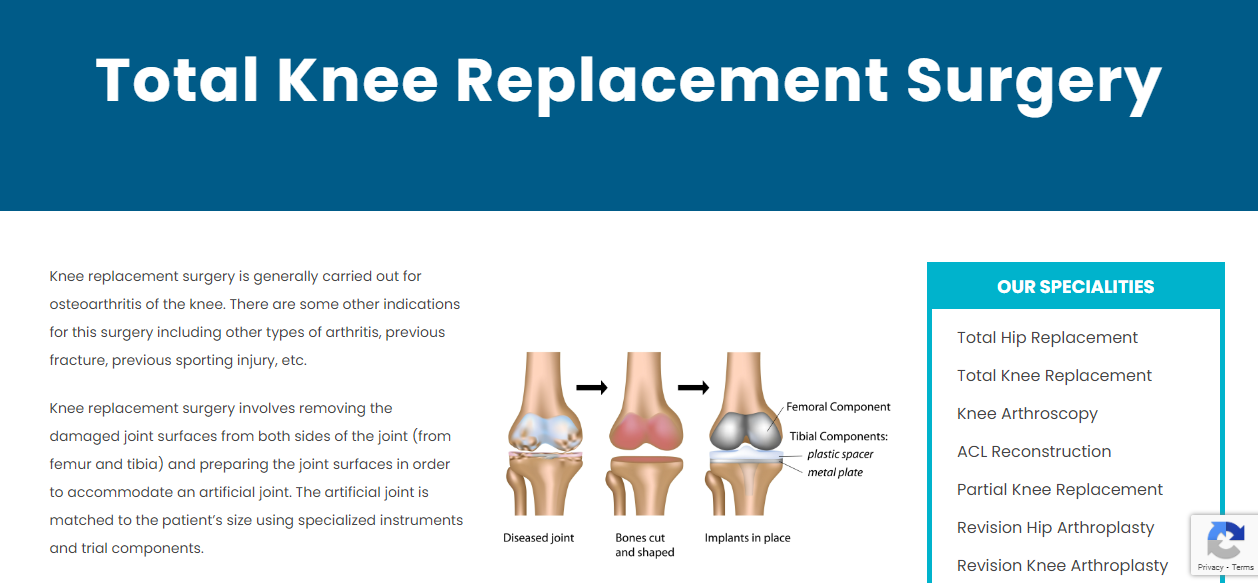Preparing for Total Knee Replacement Surgery: What You Need to Know

Strong 8k brings an ultra-HD IPTV experience to your living room and your pocket.
Introduction
Total knee replacement surgery, also known as total knee arthroplasty, is a procedure aimed at relieving pain and restoring function in individuals with severe knee arthritis or other knee-related conditions. While the prospect of undergoing surgery may seem daunting, proper preparation can significantly contribute to a smoother recovery and better outcomes. In this comprehensive guide, we'll explore everything you need to know to prepare for total knee replacement surgery.
Understanding Total Knee Replacement Surgery
Before delving into the preparation process, it's essential to have a basic understanding of what total knee replacement surgery entails. During the procedure, the damaged surfaces of the knee joint are replaced with artificial implants made of metal, plastic, or a combination of both. This effectively restores the alignment and function of the knee, alleviating pain and improving mobility.
The decision to undergo total knee replacement surgery is typically made after conservative treatments such as medication, physical therapy, and lifestyle modifications have failed to provide adequate relief. Your orthopedic surgeon will assess your individual circumstances, including your medical history, the severity of your symptoms, and your overall health, to determine if you are a suitable candidate for surgery.
Preoperative Evaluation
Once you and your surgeon have decided that total knee replacement surgery is the most appropriate course of action, you will undergo a thorough preoperative evaluation. This evaluation serves several purposes:
Medical Assessment: Your surgeon will review your medical history and perform a physical examination to assess your overall health and identify any underlying medical conditions that may impact the surgery or your recovery.
Diagnostic Tests: You may undergo various diagnostic tests, such as X-rays, MRI scans, or blood tests, to evaluate the extent of damage to your knee joint and ensure that there are no underlying issues that need to be addressed before surgery.
Medication Review: It's essential to inform your surgeon of any medications you are currently taking, including over-the-counter drugs, supplements, and herbal remedies. Some medications may need to be adjusted or temporarily discontinued before surgery to minimize the risk of complications.
Lifestyle Modifications: Your surgeon may recommend lifestyle modifications, such as quitting smoking, losing weight, or increasing physical activity, to optimize your health and reduce the risk of complications during and after surgery.
Preparing Your Home:
In addition to preparing yourself physically and mentally for surgery, it's essential to make necessary arrangements to ensure a comfortable and safe recovery at home. Consider the following preparations:
Home Safety: Remove any trip hazards, such as loose rugs or electrical cords, and install handrails or grab bars in key areas of your home, especially near the bathroom and stairs, to prevent falls.
Mobility Aids: Consider renting or purchasing assistive devices such as a walker, cane, or raised toilet seat to aid in mobility and facilitate daily activities during your recovery period.
Accessibility: Arrange for temporary accommodations on the ground floor of your home if you currently reside on an upper floor, as climbing stairs may be challenging immediately after surgery.
Support System: Enlist the help of family members, friends, or professional caregivers to assist you with household chores, transportation to medical appointments, and emotional support during your recovery.
Nutrition and Hydration:
Proper nutrition and hydration play a crucial role in promoting healing and recovery after total knee replacement surgery. Follow these guidelines to ensure optimal nutrition before and after surgery:
Balanced Diet: Maintain a well-balanced diet rich in lean protein, fruits, vegetables, whole grains, and healthy fats to provide your body with the essential nutrients it needs for healing and recovery.
Hydration: Stay adequately hydrated by drinking plenty of water throughout the day. Avoid excessive consumption of caffeinated or alcoholic beverages, as they can contribute to dehydration.
Supplements: Your surgeon may recommend taking certain supplements, such as vitamin D, calcium, or iron, to support bone health and optimize your nutritional status before surgery.
Preoperative Fasting: Follow your surgeon's instructions regarding fasting before surgery to reduce the risk of complications during anesthesia and ensure a smooth recovery.
Physical Conditioning:
While it's essential to rest and conserve your energy before surgery, engaging in gentle exercises and physical conditioning can help strengthen your muscles, improve circulation, and enhance your overall fitness level, which can facilitate a faster recovery. Consider incorporating the following activities into your preoperative routine:
Range-of-Motion Exercises: Perform gentle stretching and range-of-motion exercises to maintain flexibility and mobility in your knee joint. Your physical therapist can provide you with specific exercises tailored to your needs.
Strengthening Exercises: Focus on strengthening the muscles surrounding your knee, including the quadriceps, hamstrings, and calf muscles, to provide stability and support to the joint.
Low-Impact Activities: Engage in low-impact activities such as swimming, cycling, or walking to improve cardiovascular health and endurance without putting excessive strain on your knee joint.
Breathing Exercises: Practice deep breathing exercises to enhance lung function and promote relaxation, which can be beneficial both before and after surgery.
Mental Preparation:
Preparing for total knee replacement surgery involves not only physical but also mental preparation. It's normal to experience a range of emotions, including anxiety, fear, and uncertainty, leading up to the surgery. Here are some strategies to help you cope with these emotions and approach the surgery with a positive mindset:
Education: Educate yourself about the surgical procedure, expected outcomes, and potential risks and complications to alleviate fears and uncertainties. Knowledge empowers you to make informed decisions and actively participate in your care.
Support Network: Lean on your support network of family members, friends, and healthcare providers for emotional support and encouragement throughout the preoperative process.
Stress Management: Practice stress-reduction techniques such as deep breathing, meditation, yoga, or visualization to promote relaxation and reduce anxiety.
Visualization: Visualize a successful outcome of the surgery and imagine yourself pain-free and mobile, engaging in activities you enjoy. Positive visualization can help alleviate fears and instill confidence in your ability to recover.
Communication: Maintain open and honest communication with your healthcare team, expressing any concerns or questions you may have leading up to the surgery. They are there to support you and address any issues that arise.
Conclusion
Total knee replacement surgery can significantly improve quality of life for individuals suffering from debilitating knee pain and mobility issues. By adequately preparing yourself physically, mentally, and emotionally for the surgery, you can optimize your chances of a successful outcome and a smooth recovery. Remember to follow your surgeon's recommendations, adhere to preoperative instructions, and maintain a positive attitude throughout the process. With proper preparation and support, you can look forward to regaining mobility, independence, and an improved quality of life following total knee replacement surgery.
Book Appointment: https://lancashirehipkneeclinic.co.uk/book-an-appointment/
Note: IndiBlogHub features both user-submitted and editorial content. We do not verify third-party contributions. Read our Disclaimer and Privacy Policyfor details.


